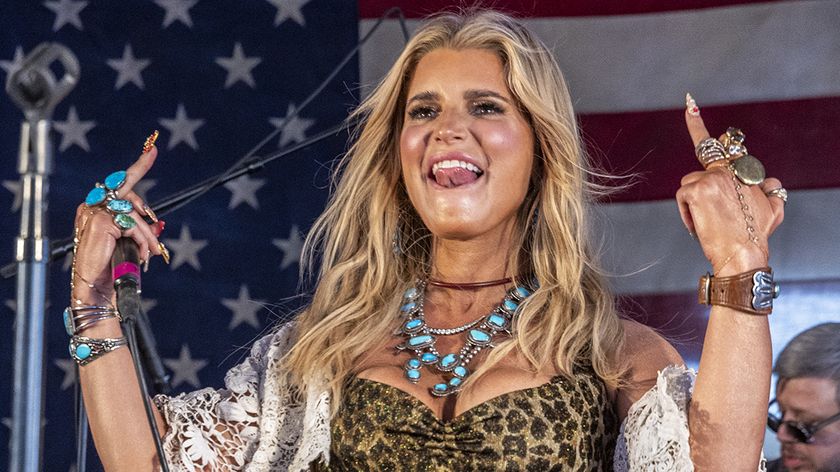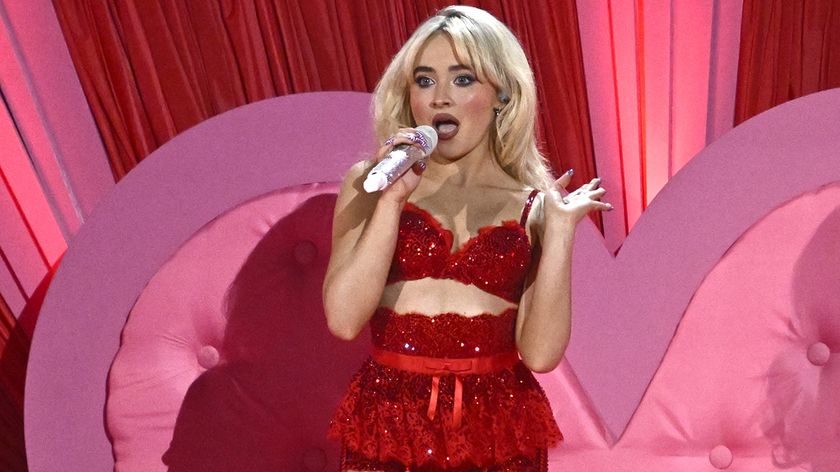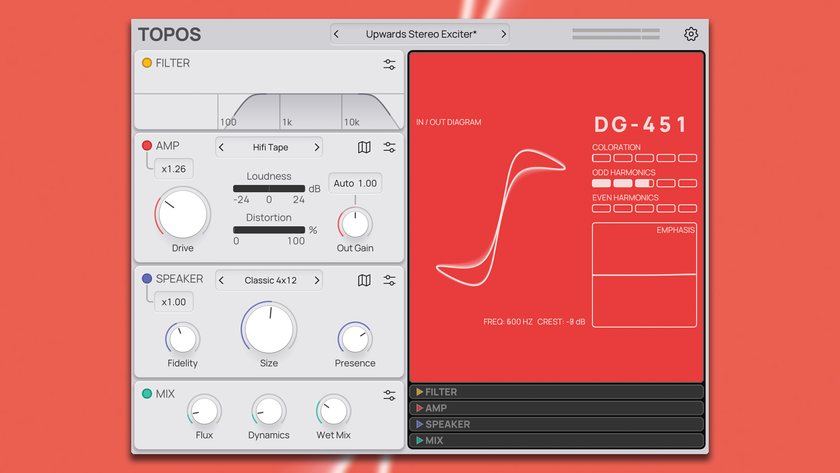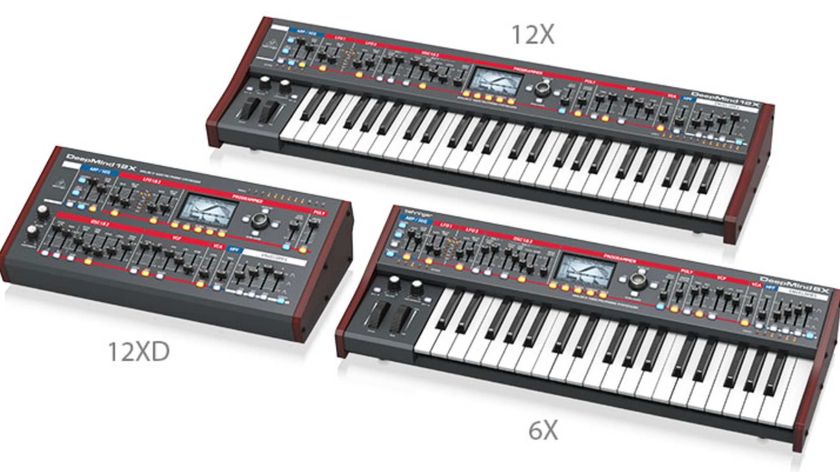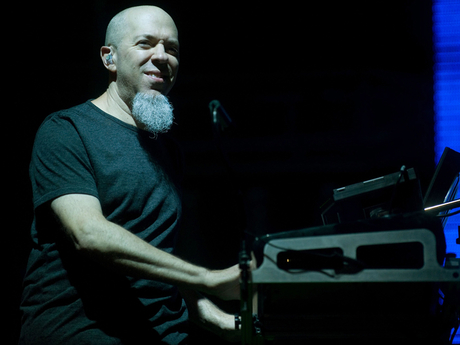

Jordan Rudess on stage with Dream Theater at the Fezen Festival, Hungary, 2011. © PETER KOLLANYI/epa/Corbis
Dream Theater are just several weeks shy of starting a massive world tour in support of their new album, A Dramatic Turn Of Events, but the band's keyboard master, Jordan Rudess, is still buzzing about their recently completed European festival dates - the group's first with new drummer Mike Mangini.
"It was so great," says Rudess. "Everybody was incredibly happy. I never realized how much a drummer can change the foundation of a band, but it's really true. I just want to have Mike Mangini checked to make sure he's really human, because the things he can do seem totally impossible."
Feats of musical daring do are nothing new to Dream Theater, and they abound on the band's highly anticipated new album, A Dramatic Turn of Events. A glittering thrill ride that runs the musical gamut from mind-numbing progressive metal to lush, heavenly ballads, it's an unqualified triumph for the celebrated, virtuosic quintet.
"I think all of our albums are filled with emotion," says Rudess. "This one might be a little more so, what with all of the changes we've been through. But I think we can all feel very proud, at the end of the day, to have come through it all with something that represents us working at the peak of our abilities. I know I can't wait for people to hear the new record. I'm really psyched about it."
MusicRadar sat down with Jordan Rudess recently to talk about A Dramatic Turn Of Events. In addition, we discussed new hardware and software he's working with, along with a certain poll he just won by a huge margin.
So MusicRadar readers voted you the Greatest Keyboard Player Of All Time. Congratulations!
Get the MusicRadar Newsletter
Want all the hottest music and gear news, reviews, deals, features and more, direct to your inbox? Sign up here.
"Thank you! Yeah, that was so flattering. What was really amazing is the fact that my heroes were right behind me. Keith Emerson, Rick Wakeman - those are the guys. It's hard to take it too seriously, because the people I look up to came up behind me. I feel as though they're deserving of the honor. But it's a beautiful thing, of course.
"I'm certainly thankful that I have such great fans. Something like this encourages me. It allows me to feel that the people are really listening and that I have their support. It's a lot of positive energy. But you know what the best thing is? My mom was very happy about it" [laughs]
There you go. We're all about making your mom happy.
"Yeah. Schlepping me off to Julliard every week finally paid off." [laughs]
Let's talk about A Dramatic Turn Of Events. Without belaboring the exit of Mike Portnoy, we're curious about some comments you made recently where you said you felt free to expand the role of the keyboards.
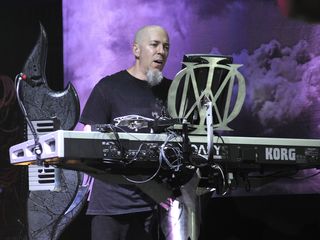
Rudess rocks the Beacon in New York with Dream Theater, 2009. © David Atlas/Retna Ltd./Corbis
"Yeah, I would say that's true. I feel that this change allowed us to rethink everybody's role in the band - who are we, where we're at, what kind of music do we want to make? We asked a lot of questions of ourselves.
"One of the things that came up was maximizing everybody's input, and yeah, the role of the keyboards was raised. How have we not been maximizing keyboards to their best advantage? Who am I, what can I do, and how can we change things and make them right?
"It was almost a spiritual thing, if you will. What kind of energy do we want to put out to the world? How can we rebuild this band? What are the kinds of things we need to do? All of those questions were important, and I think our answers are reflected in the album we made.
"It didn't all come down to me, though - it was everybody. With James, it was about his melodies, his range and how he would feel most comfortable; and as composers, how can we make sure that things really flow for him? With John Myung, who was feeling very re-energized, how can we use his enormous talents as a bassist? So yeah, it was all around.
"Coming back to me, we really took the time during the writing process to consider what I should be doing. Which was great, because I was able to pick up the pencil and paper and write stuff out. John Petrucci would come up with a heavy guitar riff, and instead of me just doubling it, the dialogue was more like 'What can we do with that?' So it was exciting. I found new ways to use the keyboards and bring the musicality in the band to a new level."
It sounds as though you feel the rebooting of Dream Theater has been extremely positive.
"Well, you know, any change is good. But let's address the situation with Mike Portnoy, and I should say right off that I'm a supporter of his. He an exceptionally talented man, and he did so much for this band, and he did so much for me, and we had such a great time making music together. I would never want to take away anything from my years with him, musically.
"Sure, everything has a balance, and yeah, there were some negatives - of course, there were. But mostly, when I think back to making music with Mike Portnoy, I'm very grateful.
"Moving forward, he decided to move on, and I can respect that. Unfortunately, it got a little turbulent and created some friction with the relationships, but hopefully everything will smooth over in time. The positive thing for me and this band, however, has been the re-evaluating and restructuring of who we are and what we do.
"Thankfully, within Dream Theater, there's a whole lot of talent to work with. We're in a really good place. We found an incredible drummer in Mike Mangini, who's talented, skilled and funny. So life is good for us. We have a lot of exciting times ahead."
In the song On The Backs Of Angels, are you playing a grand or baby grand piano?
"All of the piano sounds comes from a company called Synthogy, and it's a software called Ivory. I love that sound, as does everybody in the band. It's remarkable. At home, I play a nine-foot Steinway grand, so I'm very aware of what a great piano sounds like.
"With that awareness, I go into the studio knowing that they're not going to have anything as good as my Steinway. The Ivory sound is pretty stunning; it sounds like a beautiful grand piano miked just the right way."
When you compose a piano passage such as the one in the breakdown of On The Backs Of Angels, what is your thought process?
"Well, see, when I grew up, before I knew how to play classical music formally, my mom would bring me guitar music that had the chords and the patterns of where your fingers should go. I didn't need anybody to spell out to me E minor to A minor or anything like that - I would just play. I became very good at playing melodies and variations of melodies. I learned to improvise.
"That same thing comes into play during the breakdown of On The Backs Of Angels. We have a melody, and I'm going to improvise around that and throw in an arpeggio. Improvisation is my middle name, so that's what I went for, basically."
What do you think of the hip-hop rhythm in Build Me Up, Break Me Down?
"I really like that. I love the idea of using electronic sounds, because that's what's really happening. Personally, I'm very involved in the electronic world - not so much as it relates to Dream Theater, but in a lot of the things I do in my own time. So anything we can do to use current sounds, yeah, I'm all for it. It's cool.
"I'm kind of in charge of sonic elements in the band. The guys look to me to create those things or give my nod of approval if we're going down that path. There's a point where too much might throw people: 'What? That's not Dream Theater. What are they doing?' But I don't think we pushed it too much. It's great."
The unison playing in Lost Not Forgotten is absolutely mind-boggling.
"That's a wild adventure! [laughs] John was playing with this interesting scale on the guitar, and we had a big theme that kind of kicks in after the piano. But then we decided we wanted to start the song off with the piano, and I thought that a Chopinesque type of arrangement would work well. I used to play a lot of Chopin nocturnes - nice, moving basslines with single-note melodies from the right hand. I took that approach in Lost Not Forgotten.
"There's a lot of unison playing in the song Outcry as well, but in the beginning of Lost Not Forgotten, it's kind of a 'strap-the-seatbelts-on-and-go-nuts' thing. It makes for some interesting listening, for sure. You almost have to laugh at it, like, 'Those guys are insane!' [laughs] It's way, way over the top and then some, but that was the idea."
In Bridges In The Sky, you play a two-part solo. There's a symphonic section, followed by a proggy, all-out-jam.
"A lot goes into composing a passage like that. We have discussions within the band about what kind of form a section should be. Then, if we decide we need a part that needs to be a little more proggy, we'll try to figure out where it should go. Most things come out in improvisation. As long as we can get the ball rolling, then usually everything falls into place."
Far From Heaven is absolutely gorgeous. It's very stripped down. Did you and John Myung work most of that song up?
"Actually, John Petrucci came in with a musical thought, if you will. He played me a couple of things, like, 'Hey, check this out.' He knows I'm the kind of guy who can pick up a mood or a vibe pretty easily.
"One of the bands I really like is Coldplay. I love how they keep common tones between chords, and they find interesting ways to change chords while maintaining common tones, which all works to create a certain sound. I've wanted to do that kind of thing for a long time. Before we did Far From Heaven, I was looking at certain kinds of chords in that way. We went down that path harmonically - it was pretty cool."
What song would you say gave you the biggest fight?
"That's a good question. There were some big challenges on this record. One of the biggest was the song Outcry - and that'll certainly be the case live. Man, that song has a lot of wild, crazy, progressive stuff in it. It's nuts! [laughs]
"You know, it's one thing to play it in the studio and get it right, but for everybody to pull it off live, that'll take some doing. On a song like that, I'll have to sit down with my transcriber and figure things out. I have to look, in standard musical notation, what went down when I recorded it.
"Maybe I did something multi-tracked, and I'll need to figure out how to do it with two hands. I might have played a string part, a horn part and a piano part, and it's like, 'Oh my God, what do I do?' There's so much that goes into this."
While recording the new album, was there a new piece of gear or software that knocked you out?
"The Vienna Symphonic Library. It's an orchestral library that you can run on your computer, and it's probably the greatest orchestral library out there. It helped a lot. All of the big themes, like in Outcry or On The Backs Of Angels, or any time I mixed strings with choir, I used the Vienna Symphonic Library."
After recording the album, you've been using a new piece of hardware…
"Yes, I've been using the AirTurn BT-105 foot pedal page turner, which is made to sync up through Bluetooth to an iPad or to a computer. I'm using it right now with my iPad to turn pages. But what's really interesting - and I think we're the first ones to do it - is that my company, Wizdom Music, created software to allow me to change patches.
"This is similar to what I do in a Dream Theater concert where I change patches incrementally, but we can now do that with the BT-105 and SampleWiz. It's really, really cool. We came up with that tweak ourselves. I spoke to my partner, Kevin, and I said, 'What I'd really like to do is change patches.' I wanted to use one of the pedals and assign it to a parameter and advance patches. He said, 'Sure, we can do that.' So that's our neat little addition to the whole thing.
"I'm going to take it on the road with me, most definitely. It's an incredible piece of hardware. When using the iPad on stage to turn pages, the AirTurn BT-105 is the best option. And now, with the iPad, I won't have to reach up with my hands to change patches - I can just use the pedals."
Joe is a freelance journalist who has, over the past few decades, interviewed hundreds of guitarists for Guitar World, Guitar Player, MusicRadar and Classic Rock. He is also a former editor of Guitar World, contributing writer for Guitar Aficionado and VP of A&R for Island Records. He’s an enthusiastic guitarist, but he’s nowhere near the likes of the people he interviews. Surprisingly, his skills are more suited to the drums. If you need a drummer for your Beatles tribute band, look him up.

“Some of the biggest artists who are performing have not been announced": Tom Morello teases "surprises" at Black Sabbath's farewell gig, and advises fans to "get there early"
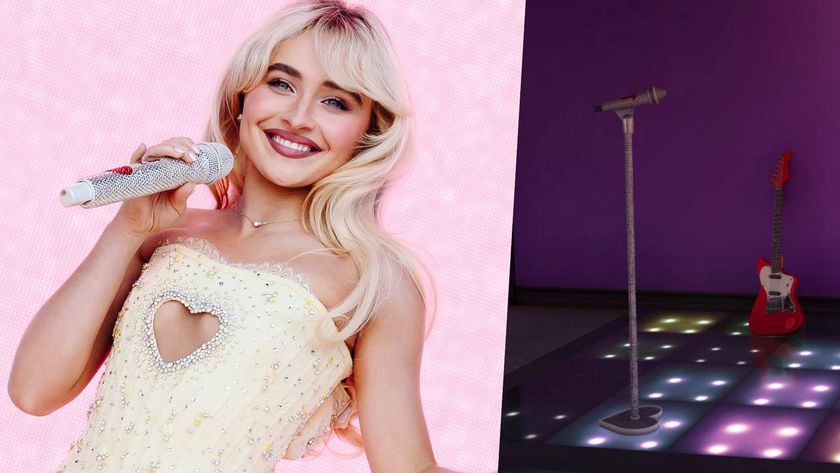
Sabrina Carpenter is set to be the next music star to appear within global video game phenomenon Fortnite


